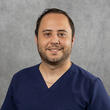Mission Statement
Welcome to the Endocrinology fellowship training at UNLV. Our mission is to train our fellows to become competent independent physicians who are able to provide care for adult patients with various endocrine disorders. Through a series of graduated learning experiences, fellows will acquire knowledge, skills and experience that will prepare them to practice clinical endocrinology.
Training Goals
- To train physicians, who upon completion of the program, will meet requirements for certification by the American Board of Internal Medicine for endocrinology, diabetes and metabolism.
- To impart sound, evidence-based training leading to graduation of physicians who are well rounded in endocrinology clinical practice.
- Create an educational environment of inquiry and creativity that will support scholarly inquiry and creativity in the areas of research, literature review and case discussions.
- Manage complex acute and chronic endocrine conditions.
Curriculum
Fellows will acquire increasing level of independence and will be assigned increasing complexity of responsibility during the course of training. The Kirk Kerkorian School of Medicine at UNLV endocrinology fellowship training is designed to run over the course of 24 months with emphasis on graduating clinically competent endocrinologists.
Training Sites
University Medical Center of Southern Nevada
The University Medical Center (UMC) is the major hospital in the Las Vegas Medical District. It represents the major site of inpatient practice by the Kirk Kerkorian School of Medicine at UNLV faculty. It provides care to a diverse mix of patients representing various socioeconomic, ethnic and other demographic populations of Las Vegas. UMC is the principal site for inpatient experience for our fellows. Fellows are exposed to patients with diseases involving all endocrine systems including Type 1 and Type 2 diabetes mellitus, gestational diabetes, lipid disorders, disorders of the hypothalamus and pituitary, disorders of the thyroid, calcium and parathyroid disorders, adrenal disorders and disorders involving the ovaries and testes.
University of Nevada Las Vegas Medicine clinic
UNLV Health encompasses the outpatient clinical practice of Kirk Kerkorian School of Medicine at UNLV faculty. The clinic provides care to diverse patients from various ethnic, socioeconomic and other demographic populations. The clinics for the various specialties within the School are geographically located at the Shadow Lane Campus of the University and other proximal sites in the city of Las Vegas. UNLV Health is the principal site for outpatient clinical rotations and electives at the UNLV campus. Fellows are exposed to a diverse mix of endocrine disorders including; Type 1 and Type 2 diabetes mellitus, gestational diabetes, lipid disorders, disorders of the hypothalamus and pituitary, disorders of the thyroid, calcium and parathyroid disorders, adrenal disorders and disorders involving the ovaries and testes.
Veterans Affair Southern Nevada Healthcare System
The Veterans Affair (VA) in Las Vegas provides care to veterans in Southern Nevada and surrounding localities. It has a higher male to female ratio compared to the other clinical rotation sites. Fellows will be exposed to patients from diverse socioeconomic, ethnic and other demographic populations with various diseases involving all endocrine systems. This will include Type 1 and Type 2 diabetes mellitus, lipid disorders, disorders of the hypothalamus and pituitary, disorders of the thyroid, calcium and parathyroid disorders, adrenal disorders and disorders involving the ovaries and testes.
Fellowship Rotations
The rotations are designed to provide a well-rounded training experience with exposure to patients with diverse backgrounds and variety of endocrine disorders. The key rotations for the Endocrinology fellowship training will include:
- University Medical Center (UMC) inpatient endocrinology consult
- Veterans Affair (VA) core endocrinology (outpatient/inpatient)
- VA fellow continuity clinic
- University of Nevada Las Vegas (UNLV) Medicine fellow continuity clinic
- UNLV Health endocrinology clinic
- Electives
- Research
The UMC inpatient consult rotation will provide fellows with the opportunity to care for patients with a diverse mix of endocrine disorders in an inpatient setting. The UMC hospital is located on the same campus as the School of Medicine and the UNLV Health clinics.
Under the supervision of endocrinology faculty, fellows will evaluate and manage patients with acute and chronic endocrine disorders either as a primary presentation or as a complication of other disease condition. The mix of diseases encountered in this rotation will include Type 1 and Type 2 diabetes mellitus, gestational diabetes, lipid disorders, disorders of the hypothalamus and pituitary, disorders of the thyroid, calcium and parathyroid disorders, adrenal disorders and disorders involving the ovaries and testes.
This rotation will be complemented by outpatient experience at the UNLV Health Endocrinology clinic. After completion of inpatient patient assessment, fellows will join the faculty at the UNLV Health faculty practice clinic. They will be assigned ambulatory patients to evaluate and discuss management plans with the supervising faculty.
This rotation will expose fellows to veterans with a diverse mix of adult endocrine disorders in the ambulatory and inpatient settings. The VA is located about 13 miles (20 minutes driving) from the Shadow Lane campus of the School. Fellows will evaluate and manage patients with acute and chronic endocrine disorders either as a primary presentation or complicating other disease condition under the supervision of the VA endocrinology faculty. Primarily, fellows will manage ambulatory patients under faculty supervision in the VA endocrinology clinic. Fellows will also evaluate hospitalized patients when consults are requested from the VA hospital services. Disease conditions encountered during this rotation will include Type 1 and Type 2 diabetes mellitus, lipid disorders, disorders of the hypothalamus and pituitary, disorders of the thyroid, calcium and parathyroid disorders, adrenal disorders and disorders involving the ovaries and testes.
The fellows have 2 separate continuity clinic locations. One will be at the UNLV Health clinic and the other at the VA clinic. Each continuity clinic will be for one half day and will run for the entire duration of fellowship training.
These continuity clinic experiences will provide fellows with longitudinal exposure to patients with a diverse mix of endocrine disorders. Under faculty supervision, fellows will evaluate and manage patients with acute and chronic endocrine disorders either as a primary presentation or complicating other disease conditions. Diseases encountered in the continuity clinic will include Type 1 and Type 2 diabetes mellitus, lipid disorders, disorders of the hypothalamus and pituitary, disorders of the thyroid, calcium and parathyroid disorders, adrenal disorders and disorders involving the ovaries and testes. Fellows typically evaluate 4 to 8 patients during each half day clinic session.
Fellows will have opportunities to explore specific and relevant topics through the electives experience. The site for the elective varies depending on the rotation. The duration of the electives will vary between 2 or 4 weeks depending on the rotation. The current selection of electives and their sites include;
- Pediatric endocrinology (UNLV)
- Wound care (UMC/UNLV)
- Podiatry (VA)
- Ophthalmology (VA)
- Radiology (VA)
In the first year of training (PGY 4), fellows will have 1 or 2 elective rotations and in the second year (PGY 5), they will have 2 elective rotations.
Fellows will learn the specific specialties under the supervision of their respective faculty.
Research is an important component of the mission of the Kirk Kerkorian School of Medicine at UNLV. Fellows will engage in research and scholarly activity during their training. Formal research rotation will occur in the second year of training. During the first year, fellows will establish with their faculty mentors and start to explore their research interests. The location and type of research/scholarly activity will be dependent on several factors including the research question, the population to be studied and the location of the faculty mentor.
Fellows will have the opportunity to learn various procedures including fine needle aspiration of thyroid nodules, management of pumps and continuous glucose monitors and dynamic testing for hormone function. These procedures will be performed under faculty supervision at the outpatient clinic sites of UNLV Health and the VA.
Didactic Conferences
The didactic conference series will be presented over the course of the academic year. Conferences will be held during weekly academic half day didactic sessions. Faculty, fellows and invited speakers will present during these sessions. Typical audience will include faculty, fellows, and residents and medical students on the endocrinology rotation. Fellows will be excused from clinical duties during the academic half day and when on leave, the session materials will be recorded for future viewing. Remote access to conferences will also be made available when rotating at sites outside of the conference location.
The didactic conference series will include;
- Endocrinology Core Lecture series (weekly)
- Case/mortality and morbidity conferences (weekly)
- Research/quality improvement conferences (biweekly - monthly)
- Journal club (monthly)
- Grand rounds (monthly – quarterly)
- Board review (weekly)
How to Apply
Two fellows will be selected each year. Eligible candidates for this position should have completed 3 years of post-graduate training in Internal Medicine and are eligible for board certification in Internal Medicine by the ABIM at the time of starting.
Applications must be received through the Electronic Residency Application Service (ERAS). Applications materials to submit should include items listed below;
- ERAS application
- Updated curriculum vitae
- Personal statement
- Medical school transcript
- Medical Student Performance Evaluation (MSPE)
- USMLE official transcript
- 3 letters of recommendation including one from the Internal Medicine residency program director and one from an Endocrinologist
Selection of all candidates will be conducted through the National Residency Match Program.



